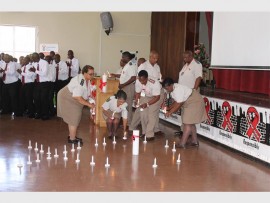Leeuwkop Prison commemorates World Aids Day
LEEUWKOP – Commemorated each year on 1 December, World Aids Day is an opportunity for every community to unite in the fight against HIV and to show support for people living with HIV and remember those who have died.

Doing just that, Leeuwkop Prison recently held a TB and HIV and Aids Commemoration Day, on 24 November.
According to Vusi Hlatswayo, regional head of development and care for the Department of Correctional Services, when World Aids Day was declared, November was acknowledged as the build-up to International Aids Day.
Speaking at the commemoration day, Hlatswayo explained that the day was all about celebrating their achievements, the UN Aids World Aids Day theme from 2011 to 2015 is “Getting to Zero.”
This year, South Africa focused on zero discrimination, without losing sight of the other zeros, being zero new HIV infections and zero Aids-related deaths.
The aim of this campaign was to ensure that the rights of people living with HIV and Aids were not violated, and that discrimination on the basis of HIV, Aids and TB is reduced, and ultimately eliminated.
Dr Nombuso Madonsela, from the Department of Health, commended the Department of Correctional Services for its continuous commitment and work in the fight against HIV, Aids and TB, particularly for its 100 percent TB cure rate for inmates in 2015.
Despite this, Madonsela expressed concern on the high rate of infection of the disease, “We are still not able to combat the disease and are not doing well on the prevention.“
According to Hlatswayo, the Department of Correctional Services had a range of prevention services in place in an attempt to meet its target of zero infection. He explained that despite this there were still many challenges, “When you’re doing this work, you continuously strive to do better,” he said.
Madonsela added that the department of Health had since adopted a new strategy in an attempt to decrease the high infection rate, and planned on targeting those most susceptible to contracting the disease, such as men having sex with men, sex workers and women and young girls living in informal settlements. “We are going to look for people who are most likely to be HIV positive; putting a person on treatment is not enough,” she emphasised.
Madonsela added that the Department of Health was also working on a new system which would enable them to easily track those who were on treatment.
Gloria Lekubu, regional coordinator for HIV and Aids explained there were currently 7 000 inmates who were HIV positive and 4 000 who were currently on anti-retroviral therapy treatment. She was, however, unable to state how many had contracted the disease in prison, “Ultimately inmates – like everyone – are not forced to check their status or disclose it when entering prison,” she explained.





